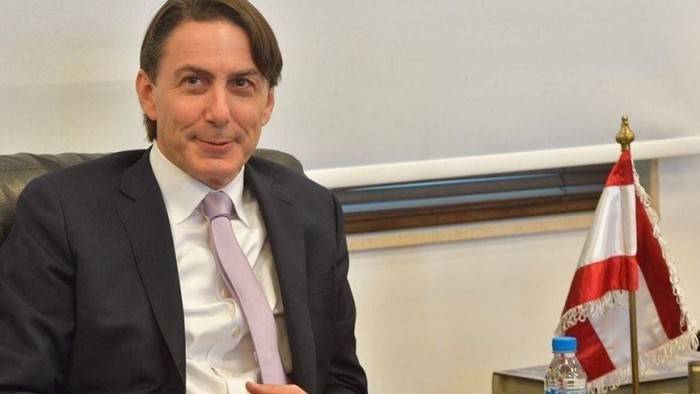The U.S. Special Presidential Coordinator for Energy, Amos Hochstein, confirmed that the delay in gas and electricity supplies from Egypt and Jordan is due to the Lebanese government's failure to implement simple reforms required by the International Monetary Fund (IMF), which is supposed to finance the project. He anticipated that it would take three to four years to produce gas from Lebanon's Block 9, considering that the maritime border demarcation agreement between Lebanon and Israel has become a fait accompli with no signals from Israel about possibly canceling it. He believed that the land border demarcation between Israel and Lebanon is possible, but not under the current conditions in both countries. Hochstein's remarks came during an interview with "An-Nahar Al-Arabi," as follows:
*How do you expect the implementation of the maritime border demarcation agreement between Lebanon and Israel to proceed now with Netanyahu's government, which has been heavily criticized, and without an elected president in Lebanon?*
- First, there are now international maritime borders respected by both countries. The agreement is now a reality that has been established for the first time between the two countries, and it does not wait for implementation. Furthermore, I have seen no indication that the new government in Israel intends to reject or distance itself from the agreement. There were some criticisms of the agreement before it was regulated, and it was then transferred to the Israeli Supreme Court, which approved it, and since then, there have been no criticisms. When they look at the content of the agreement, they recognize the benefits of maintaining it. What you see is the actual implementation of this agreement on the ground. "Total Energies" from France and "Eni" from Italy have exploration rights in Block 9 and have begun announcing their movements to commence exploration, which does not happen overnight; it requires sending a technical team and setting up offices and housing, which has started, and that is good news. There is no need for a government to do all that. However, I hope a president is elected, and a government is formed in Lebanon—not just for border demarcation but for Lebanon's interest. The border demarcation between Lebanon and Israel is not the solution to all issues; the government has responsibilities to address the economic crisis and energy problems in Lebanon.
*Is Qatar involved in the agreement with the companies?*
- I spent a lot of time with my French counterparts, and at difficult moments, President Biden spoke with President Emmanuel Macron to seek help and support. I talked to President Macron and his team, and we are grateful for the French support for what we are doing. There is a separate agreement between the two countries because no relations exist between them, resulting in a separate agreement between the French and Italian companies and Israel, which we managed to finalize in parallel. As for other companies in the consortium, that is currently being studied, and I should not preemptively comment on negotiations with different countries' companies.
*When do you expect the Israeli Karish field to begin exporting gas to Europe?*
- Karish is not currently exporting gas to Europe; efforts are currently focused on supplying the Israeli local market with gas. Gas from Karish may replace the gas produced by the American company Chevron for local consumption, and it can currently export to Egypt, which consumes part of it locally while exporting the remainder to Europe or other markets.
*Why has the project to export Egyptian gas to Lebanon and electricity from Jordan been delayed? Some say it's a problem from Congress, while others say the obstacle is from the World Bank. What is the truth?*
- When I returned to the government in September 2021 and began assessing the painful and collapsing economic situation in Lebanon, I have loved your country for its history, culture, and food for thirty years. The region is rich in natural resources and electricity. We supported negotiations between Lebanon and Egypt for Lebanon to purchase gas from Egypt, which would be exported to Jordan and then to Syria, where it would be exchanged for Syrian gas that is delivered to Lebanon, potentially providing Lebanon with four to five hours of electricity a day. This was a good development, but it requires complex negotiations because it is based on negotiations with Egypt and separate negotiations with Jordan and very complicated negotiations with Syria, which is under U.S. sanctions on the Assad regime, and payments cannot be made to Syria. The U.S. is trying to assist Lebanon in this process and ensure it is done in a manner that does not violate U.S. sanctions.
There was then support from various organizations to ensure that the pipes and infrastructure for this gas flow appropriately, and the Lebanese portion had been damaged but was repaired and ready to work and receive gas immediately. To achieve this, there are three conditions: Lebanon must fulfill its reform commitments; there is no justification for the Lebanese government not to take three simple steps, such as appointing members of the board of the electricity company and engaging an auditing firm, among other measures, to ensure transparent operations and recover costs by imposing fees on electricity to repay the loan to the World Bank. When Lebanon implements the reforms, the World Bank can provide a loan because this gas is not free. Lebanon, being bankrupt, cannot afford it and needs an international organization to fund such a process, provided that Lebanon collects the electricity fees to repay the World Bank loan. When the reforms are executed, the U.S. Department of the Treasury will audit to ensure that this is not a violation of sanctions on Syria, and I am confident there will be no objections from Congress, the U.S. government, or the World Bank; the matter is simply that Lebanon needs to do what it must. For months, I have heard from the Lebanese that they will implement this in a few days, and we are still waiting. As time goes by, the people suffer, and costs rise. This is shameful because this could have been accomplished in eight weeks, and then gas quantities could have increased, along with electricity through interconnection with Jordan. Much can be accomplished in this sector, but as long as the ruling leaders in Lebanon hinder reforms, not even the minimum actions can proceed. Lebanon can complain about the World Bank or the United States or others, but it must do what is required of it.
*When do you think Lebanon can benefit from gas revenues if the gas field appears promising?*
- In 2023, exploration may take place, and we should have an idea if there is commercially viable gas and where it is located and if its region is complex or not. After that, a development plan for this gas is set, meaning that within three to four years, we can see gas being produced in Lebanon, but we should not wait for that. Notably, for the first time in years, companies are investing in Lebanon.
*President Biden thanked his French counterpart twice for his support; is this due to pressure from France on Total, or did Macron negotiate with Hezbollah and Iran for that?*
- I am not aware of any dialogue between France and Hezbollah.
*What made Hezbollah agree to this matter? Did Gebran Bassil play a key role in the negotiations, as rumored?*
- I am the last person to pose that question. I have visited Lebanon several times, and I have walked and strolled a lot in the country, and I have seen that the majority of the people support this agreement. Hope is fundamental, and I believe that if several different political parties had obstructed this agreement, it would have contradicted the interests of their supporters. I am not talking about specific parties but rather the majority. I directly negotiated with the three presidents: with the president and his team, Nabih Berri, and the prime minister and the military representative, and the negotiations were transparent. I know Bassil is part of the political system in Lebanon, but he was not in the room when I negotiated with President Aoun or Elias Abu Saab or others.
*Are you trying to negotiate the land border demarcation between Israel and Lebanon, and is this impossible?*
- Generally, I am someone who does not believe such matters are possible before they are acted upon. What we accomplished regarding maritime border demarcation does not indicate the possibility of successfully demarcating the land borders. The borders differ in their implications; what is needed to implement one does not apply to the other. They should not be coupled, and I insisted on separating them to prevent matters of one from affecting the other. The success of the maritime border demarcation indicates that when we think creatively and outline what each side's benefits and losses are, we can find solutions. I won't go into the details of the land borders, but we are fully convinced that reaching an agreement on land border demarcation is possible, but this is always done at the right time. I do not know if the timing is right now; of course, it would be better when there is a president in Lebanon and a formed government there, as the situation in Israel with a government being formed necessitates waiting.




